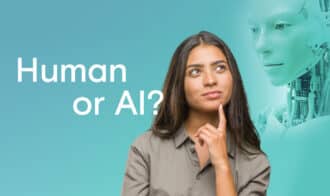Hospitality is a very human-centric field. Whether it’s a hotel, restaurant, or place of entertainment, a person will be there accompanying you every step of the way—that’s what we’ve come to expect in customer service. But, just because we’ve become accustomed to it, does that mean it’s the best possible experience? Artificial Intelligence has been taking the hospitality industry to a new level by increasing customer service touchpoints and providing efficient and effective support with around the clock availability.
Much of this evolution is apparent in the hotel industry, and while there is a hotel in Japan completely run by robots, most of the inclusion of AI is significantly more subtle. Chatbots, booking portals, smart apps / appliances, and even a few robots all work together to create the ideal hotel environment for guests.
Robots: The New Friendly Face Greeting You
Physical robots became a permanent part of the hotel industry in 2015 when Henn-Na Hotel of Nagasaki opened a hotel fully run by robots. Porter robots were designed to carry luggage, while humanoid robots serve at the concierge. For English speakers, there’s a dinosaur robot that can assist with checking you into the hotel. Another robot, Connie, is equally well known as Hilton’s first robot residing at a Hilton hotel in Virginia. Connie was introduced to customers in 2016 and is also designed to help customers check in and answer any questions that they may have.
While these robots help check in and answer everyday questions, they aren’t programmed to give the same generic response based on the type of question asked. An AI model was first trained on what information is associated as the correct answer when asked a question. These models then learn to recommend certain answers that are normally deemed as the solution by the person they are assisting. To further enhance the user experience, the models are also taught to not just list the same recommendations repeatedly. They also suggest new restaurants and tourist attractions based on a variety of factors like time or year or if the business is open. This ensures that the user gets suggestions they will actually find helpful.
Robots that can emulate human behavior are powered by models that use robust training data. That means it receives natural language processing inputs in local dialects and vernacular, in speech nuances, mood, as well ontology mapping and relevance.
Always Free to Lend a Hand
Robots improve the customer experience by
- Being available 24/7 to assist customers
- Provide suggestions for food or entertainment
- Reduce wait time in lines
- Assist customers in their native language
Unlike humans, robots are able to work 24 hours a day, which means providing service overnight when staffing is reduced, or in some cases when no concierge staff is available as the front desk is closed. They can also assist customers by assisting them in their native language. For extremely touristy areas this is a significant advantage as it ensures no miscommunications and the customer is assisted promptly.
It’s important to note that robots will never fully replace humans. Both robots and humans aren’t perfect; if a robot breaks down or experiences some sort of malfunction, a human will be needed to assist. The goal is to ease the burden placed on this hospitality industry. According to Business Insider, in November 2021, of the 4.5 million Americans that participated in the great resignation, 1 million of those belonged to the restaurant and hotel industry.

Chatbots: Is that a Human or Robot You’re Talking to?
It’s now commonplace for a little chat bubble to appear on a website, giving the visitor the opportunity to quickly chat with a live support agent. Over the years, top companies are leveraging AI to triage these conversations. In some cases, AI gathers initial information before getting the appropriate support agent to assist. In others, companies use AI from start to finish. The questions these chatbots could answer in the earliest stages of AI-enabled hospitality were simple ones like store hours or how to cancel or place an order. Today, chatbots can handle a variety of more complex tasks and questions including:
- Placing, cancelling, or modifying orders / bookings
- Applying discounts
- Providing suggestions for activities to do and places to visit
- Addressing customer concerns and complaints
This is exemplary of the role robots play within the actual hotel. A similar machine learning model is trained with the same types of questions robots are asked on location. It also means that customers get the same types of benefits from the implementation of chatbots on websites.
Chatbots improve the customer experience by:
- Being available 24/7 to assist customers
- Providing suggestions for food or entertainment
- Delivering consistent information for each customer
- Assisting customers in their native language
- Assisting those who prefer not to talk in-person or on the phone
Two notable benefits are the consistency of responses and being a preferred method for those customers whose preferred method of communication is online chat. While robots also improve the customer experience, chatbots have more emphasis in this area because standard questions are more frequently asked to chatbots on websites. Oftentimes, potential customers will ask chatbots questions about amenities, daily specials for hotel restaurants, and operating hours. Ensuring that these questions are answered correctly each time increases customer satisfaction as the customer experiences exactly what they were told.
Customer Service Can Save the Day
Chatbots and robots work hand in hand. In the customer journey, chatbots are a phase 1 AI solution; They answer initial questions to secure the booking. Robots play a critical part in phase 2; they help check in customers and provide solutions and recommendations to make their stay even better.
Various chatbots and conversational AI projects are fuelled by Appen data, to enhance the customer experience across a variety of industries. When combined with natural language processing (NLP) & speech technology we can ensure each question is answered accurately and customized to address each customer’s unique needs. We achieve this by using AI to aide in generating text from dialogue or translating text from one language to another. After the initial AI work is done, our team of highly skilled linguists reviews and evaluates to ensure everything is correct.
How we are treated has a significant impact on our experience. Good customer service tends to lead to happier and repeat customers, while poor customer service can easily lead towards the opposite and lose business. At Appen we are committed to making sure the AI models we work on will deliver outstanding customer service. Afterall, everyone deserves to be treated fairly with a positive customer service experience.
To learn more about the positive impacts that are being made in the hospitality industry, watch our new Tech Talk for our new series Bound to Succeed: AI Tech Talks with Wilson Pang where we talk about How Airbnb Delivers on Hospitality with World Class AI.











